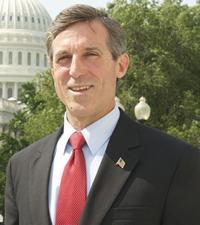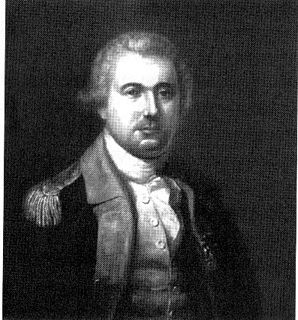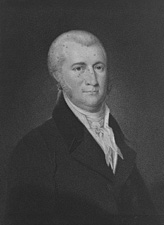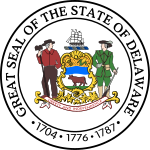
The Fifth United States Congress was a meeting of the legislative branch of the United States federal government, consisting of the United States Senate and the United States House of Representatives. It met at Congress Hall in Philadelphia, Pennsylvania, from March 4, 1797, to March 4, 1799, during the first two years of John Adams' presidency.

This is a chronological listing, in timeline format, of the United States Congressional Delegations from Delaware to the United States Senate and United States House of Representatives. U.S Senators are elected by popular vote for a six-year term, beginning January 3. Since 1831, elections in Delaware have been held in the first week of November of the year noted. Before 1914 United States Senators were chosen by the Delaware General Assembly and before 1935 all Congressional terms began March 4.

John Middleton "Jack" Vining was an American lawyer and politician from Dover, in Kent County, Delaware. He was a Continental Congressman from Delaware, and a member of the Federalist Party, who served in the Delaware General Assembly and as United States Representative and United States Senator from Delaware.

The Delaware House of Representatives is the lower house of the Delaware General Assembly, the state legislature of the US state of Delaware. It is composed of 41 Representatives from an equal number of constituencies, each of whom is elected to a two-year term. Its members are not subject to term limits. The House meets at the Delaware Legislative Hall in Dover.

Elections to the United States House of Representatives for the 6th Congress took place in 1798 and 1799, the earliest in New York in April 1798, and the latest in Tennessee in August 1799, after the official start of the 6th Congress on March 4, 1799, but before the start of the first session of this Congress in Philadelphia on December 2, 1799. It was the last congressional session before the move to the new capital at Washington, D.C..
George Latimer was a Philadelphia merchant and member of the Pennsylvania House of Representatives. He served as speaker of the Pennsylvania House 1794–1798.
The United States Senate elections of 1798 and 1799 were held at the middle of President John Adams's administration and had no net change in political control of the Senate.
The 1798 United States House of Representatives elections in New York were held from April 24 to 26, 1798, to elect ten U.S. Representatives to represent the State of New York in the United States House of Representatives of the 6th United States Congress.
The 1800 United States House of Representatives elections in New York were held from April 29 to May 1, 1800, to elect ten U.S. Representatives to represent the State of New York in the United States House of Representatives of the 7th United States Congress.

The 1808 United States House of Representatives elections in New York were held from April 26 to 28, 1808, to elect 17 U.S. Representatives to represent the State of New York in the United States House of Representatives of the 11th United States Congress. At the same time, a vacancy was filled in the 10th United States Congress.
The 1816 United States House of Representatives elections in New York were held from April 23 to 25, 1816, to elect 27 U.S. Representatives to represent the State of New York in the United States House of Representatives of the 15th United States Congress. At the same time, a vacancy was filled in the 14th United States Congress.

The 2012 United States House of Representatives election in Delaware took place on Tuesday, November 6, 2012. Voters elected a member of the United States House of Representatives to represent Delaware's At-large congressional district, encompassing the entire state of Delaware. Incumbent Democratic Representative John Carney defeated Republican challenger Tom Kovach to win a second term.
Elections to the United States House of Representatives in Pennsylvania for the 6th Congress were held October 9, 1798

The Delaware United States House election for 1789 was held on January 7, 1789. The former Continental Congressman John Vining won the election and became Delaware`s first Representative to the House of Representatives.

The Delaware United States House election for 1792 was held on October 2, 1792. The former Continental Congressman John Vining chose not to run for reelection and was followed by John Patten.

The Delaware United States House election for 1804 was held from October 13 - 20, 1804. The incumbent Representative Caesar Augustus Rodney was defeated by the former Representative James A. Bayard Sr., who he had defeated in the previous election, with 52.12% of the vote.
A special election was held in North Carolina's 10th congressional district on August 2, 1798 to fill a vacancy left by the death of Nathan Bryan (DR) on June 4, 1798

The 2014 United States House of Representatives election in Delaware was held on Tuesday, November 4, 2014 to elect the U.S. Representative from Delaware's at-large congressional district, who will represent the state of Delaware in the 114th United States Congress. The election coincided with the election of a U.S. Senator from Delaware and other federal and state offices. Incumbent Democratic Congressman John Carney won re-election to a third term in office.
The 1798 United States elections occurred in the middle of Federalist President John Adams's term. Members of the 6th United States Congress were chosen in this election. The election took place during the First Party System. The election saw no significant partisan change, with the Federalists keeping control of both houses of Congress.












